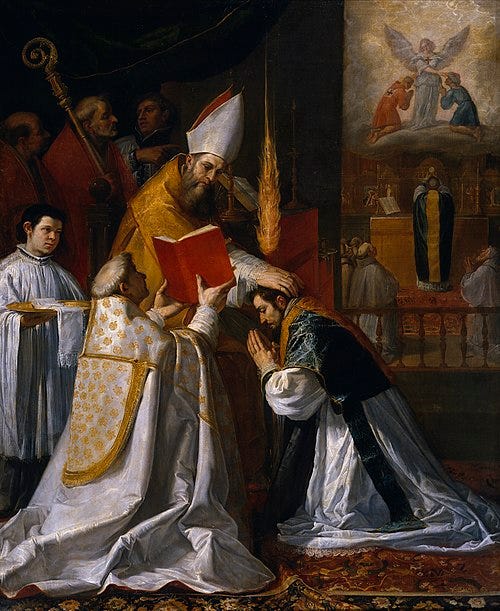A New Creature: The Gift of the Priesthood
Saturday, June 14th Readings Reflection: Saturday of the Tenth Week in Ordinary Time
“If then any be in Christ a new creature, the old things are passing away, behold all things are made new. But all things are of God, [W]ho hath reconciled us to [H]imself by Christ; and hath given to use the ministry of reconciliation. For God indeed was in Christ, reconciling the world to [H]imself, not imputing to them their sins; and [H]e hath placed in us the word of reconciliation. For Christ therefore we are ambassadors, God as it were exhorting by us” (2 Cor 5:17-20 DRB).
These beautiful words from today’s Epistle remind us of the Catholic priesthood, to which many men are being ordained throughout America in these last weeks of spring. Throughout the country, dioceses have been joyfully celebrating the priestly ordinations of men who have selflessly answered God’s call to imitate Him in being instruments of grace and salvation.
At his ordination, a priest becomes a “new creature” in Christ, as St. Paul says in today’s Epistle. When the bishop lays his hands on the ordinand’s head, he receives an indelible character on his soul that marks him eternally as a priest for Christ. The priest’s soul, which received sanctifying grace in Baptism and the outpouring of the Holy Spirit in Confirmation, receives a new identity that will last for all eternity. Even if a priest is later laicized, by which the Church relieves him of his priestly ministry, this indelible character remains on his soul for eternity.
In the next verse from today’s Epistle, St. Paul mentions the ministry of reconciliation. This calls to mind the Sacrament of Confession, which is sometimes called Reconciliation due to its effects in reconciling the souls of sinners with God. Through the ministry of the priest, who pronounces the words of absolution, souls dead in mortal sin are restored to the life of grace and reconciled once more to union with God. The Sacrament of Confession enables souls to receive the Holy Eucharist worthily, even if they have once fallen into grave sin.
At their ordinations, priests receive the “ministry of reconciliation” to which St. Paul refers. By the laying on of the bishop’s hands, priests receive the authority from God to bind and loose, to forgive sins as the vessel by which Christ pours forth His Blood from the Cross onto the souls of sinners. Through their priestly ministry, ordained priests are indeed ambassadors, exhorting the faithful entrusted to them by God to repent and accept the grace so freely offered to them.
As St. John Vianney beautifully said, “The priest is not a priest for himself: he does not give himself absolution; he does not administer the Sacraments to himself. He is not for himself; he is for you. The priesthood is the love of the Heart of Jesus Christ. When you see the priest, think of Our Lord Jesus Christ.” Today’s Gospel reminds us of the Source of the priestly ministry, by which mortal men act in persona Christi, in the person of Christ. Without priests, we cannot receive the sacraments, absolution, or the Eucharist.
The priesthood is necessary for our salvation, reconciling us with the Sacred Heart of Jesus. May we never take the gift of the priesthood for granted, and may we always pray for our priests. In this season of priestly ordinations, may we especially pray for those who have recently been ordained to the priesthood, that God may strengthen and guide them to faithfully live out their calling for His glory and the salvation of the faithful.
“May the Lord Jesus Christ, [W]hom the Father anointed with the Holy Spirit and power, guard and preserve [them] that [they] may sanctify the Christian people and offer sacrifice to God” (prayer from the Rite of Ordination).



The catechism, in CCC 1546, tells us that we are all participants in the one priesthood of Christ. All of us are ambassadors of Christ. The universal call to holiness is a corollary of this priesthood. The presbytery in the New Testament is not called a priesthood. The presbytery is for those who are already priests prior to Holy Orders. We are all priests of the order of Melchizedek. Views that were prevalent prior to Vatican II die hard.